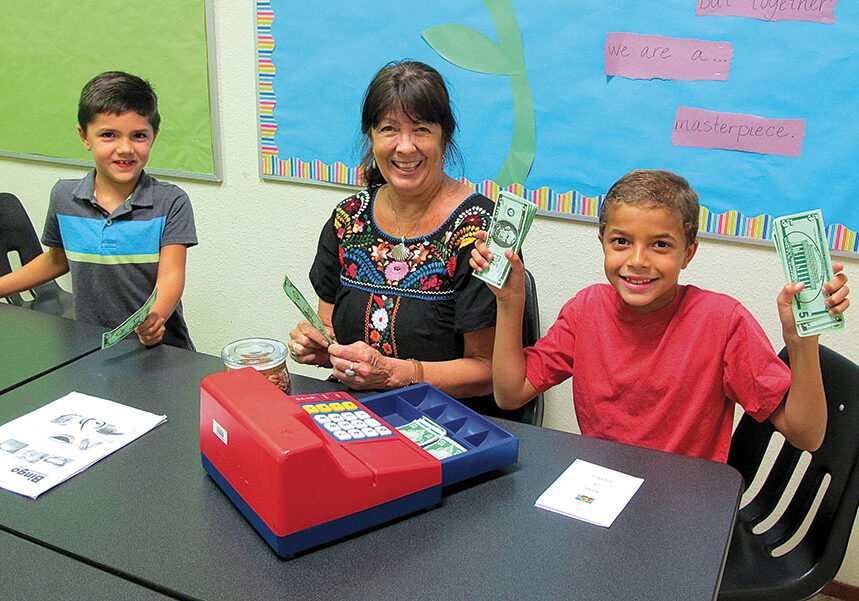 Growing up, my first real job was waitressing at the lunch counter of our local Woolworth’s store in downtown Redding. At the age of 16, I was making an awesome $1.75 an hour and feeling pretty special when that pay envelope hit my hands. Having been raised in a large family where money was tight, I learned through experience the value of being frugal.
Growing up, my first real job was waitressing at the lunch counter of our local Woolworth’s store in downtown Redding. At the age of 16, I was making an awesome $1.75 an hour and feeling pretty special when that pay envelope hit my hands. Having been raised in a large family where money was tight, I learned through experience the value of being frugal.
We try to teach our kids to be street-smart and use good manners, but teaching them the financial facts of life can be difficult. As I have watched my own kids at their first part-time jobs, I have seen them “squander” their money on everything from junk food and ring tones to $500 prom dates.
You can set good examples of what it means to save, spend wisely and share with others. You’ll make more of an impression on your kids if they can see and hear what you’re doing to manage your money. Let them help with simple tasks like balancing a checkbook. The following are good guidelines for teens to manage their money effectively:
1. Start Saving Early.
One of the best tools is to start a savings account when your kids are 7 or 8. Even at $20 every couple weeks, the savings will add up to a noticeable balance by the time they are older. Many parents reward their kids for sticking with a savings plan by matching or adding to what they contribute.
2. Set Spending and Savings Patterns Early.
Encourage them to decide in advance how much should go into savings (the concept of “pay yourself first”) and how much should be set aside to share with others (for charity or holiday gifts).
3. Encourage Work Experience.
Summer or part-time jobs can teach young adults good business skills and how to be responsible. Or perhaps they are interested in starting their own businesses. They may truly enjoy earning and saving their own money.
4. Set Up Checking Accounts.
Helping your teen establish a checking account is an important step in teaching financial responsibility. Most community banks and credit unions offer special plans for teens.
5. Check Online Resources.
Sit down with your teen at the computer and visit personal financial literacy sites for tips and tools for good money management. My BOC offers resources at http://www.myboc.net. The FDIC has a financial educational program for youths between the ages of 12 and 20 that explain the basics of good money-management. You can order a free CD of the FDIC’s “Money Smart for Young Adults” at: http://www.fdic.gov/consumers/consumer/moneysmart/young.html
By setting some patterns while they are under your roof, your kids can learn good spending and budgeting habits, which will serve them well for the rest of their lives.
Posted in: Parenting, Youth & Teen
Comment Policy: All viewpoints are welcome, but comments should remain relevant. Personal attacks, profanity, and aggressive behavior are not allowed. No spam, advertising, or promoting of products/services. Please, only use your real name and limit the amount of links submitted in your comment.
You Might Also Like...

How To Throw an Eco-Friendly Birthday Party Your Kids Will Love
Children are learning at an early age how important it is to protect our environment. Whether they hear about climate change, plastic pollution, animal extinction or other critical environmental issues […]

The Benefits of Early Second Language Learning
As I approach the classroom to pick up my kids, I can hear children’s voices but the dialogue isn’t clear. Judging by the giggles and loud chatter I can tell […]

Strengthen Emotional Intelligence as a Family
Children do what we do, not what we say. As we manage – or don’t manage – our own emotions and behaviors, we usher our children into the same coping […]

To My Teenage Son: What I Want For Mother’s Day From You
I know better than to expect a handmade card from you this year. Or a necklace made out of macaroni noodles or a stone painted with the words, “Mom, you […]


